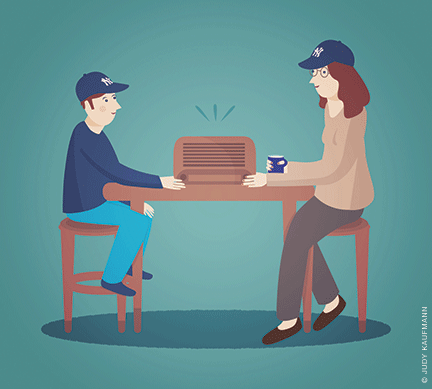Mother, son, and baseball on the radio.
 By Daniel Blas | “Twenty-six up, twenty-six down,” roared the radio announcer, “and the crowd is on their feet.”
By Daniel Blas | “Twenty-six up, twenty-six down,” roared the radio announcer, “and the crowd is on their feet.”
We were too, my mom and I, as we had been the past three innings, jumping up and down on her queen-sized bed, holding hands as the last batter approached the plate.
“Mom! What are you doing??” wailed my younger sister from below. “Get down!”
No Yankee had pitched a—I was forbidden from saying the word for fear of ruining it—in years. While my mother can recall her exact location when the Bronx Bombers concocted their last two perfect games—events as indelible in her memory as Nixon’s resignation and the last episode of M*A*S*H—this was the first shot at history in my lifetime. And no bratty five-year-old was going to stop our celebration.
It was over in one pitch. Mike Mussina surrendered a bloop hit, and in slow-motion we collapsed onto the comforter, burying our heads in pillows of mourning. Something had died with the swing of a bat, a concept not lost on my nine-year-old brain.
That 2001 season was my first real one as a Yankee fan, according to the official scorekeeper: my mother.
In our home, she was the authority. The Bronx-born, lifelong New Yorker had little use for street addresses not appended with subway stops, and regarded the drunks at Yankee Stadium as loyal comrades. When she asked for “the score,” the correct response was never, “Which one?”
When she married a Baltimore native, there would have been no who-will-the-kids-root-for? negotiation. I can almost picture her relegating my dad’s Orioles cap to the highest closet shelf, thinking herself generous for allowing the contraband in the house.
I had no choice in the matter, but inheriting a winning team was hardly something to complain about. Inevitably, though, I had complaints. They began at 8:25 on any given playoff night that year, five minutes before my bedtime and five innings before a winner emerged. All my friends watched it on TV straight through the postgame show, I pleaded. They were even allowed to watch Survivor afterwards!
But no meant no, and so off I went to bed, first selecting two potential outfits for the next day: blue sweatpants and a Paul O’Neill jersey if the Yanks eked out the win; blue sweatpants and something generically puerile if not.
When the games ended, my mom would tape a note to the top rung of my bunk bed so that I could blurrily read the score the next morning.
“Yanks win!” the scrawled handwriting would tell me. “4-3. Jeter homer to win it.” I couldn’t read cursive, so I rarely got past the first two crucial words.
This arrangement worked until I got a handheld AM/FM radio for my birthday: my key to another inning or two before exhaustion set in.
“Don’t stay up too late,” my mother would warn as I padded out of the living room, in flannel pajamas emblazoned with essential baseball exclamations: “Outta here!” “Homer!” “Stee-rike!”
She left her words intentionally vague, knowing full well that when I settled into the upper-deck seat of my bed, I would absorb the radio exactly as we had done together all season. To disappear into the “picture-perfect nights” of John Sterling’s vivid color commentary was to exchange my tween-age troubles for a warm feeling of solidarity with my mom, my teammate. Because the game—or more accurately, the radio broadcast—was ours. All that year, when I finished my schoolwork, we’d turn it on, analog dial preset to the correct station. Radio only; never the television. It somehow felt more authentic that way.
And we were an audience of two. Sometimes my father would try to ease his way into the fold. “I heard yelling coming from the bar downstairs,” he would say, arriving late from work into the thick of our post-game analysis, “so I assumed we won.”
“You can’t say we, Dad,” I’d object. “You don’t even like the Yankees.”
And then he’d launch into some story about that time at the Baltimore DMV when he bumped into an Orioles pitcher who’d lost his wallet.
Figures , I’d think. It’s because he played for the Orioles.
Nor did my sisters ever truly appreciate the sport and our ritual. It was something only my mom and I shared.
Like the good oldest children we both are, we often shielded our personal frustrations from public view. But in the comfort of our apartment, surrounded by Sterling’s voice, we let emotions fly. I’d be walking down the hall after taking out the garbage and hear a disembodied scream—“ Woooohoooo! Base hit!”—followed by complaints from at least two sisters. I’d hustle back to our abode, where we cranked up the volume to full blast, so loud we couldn’t think. Then—just our luck—some rookie would hit into a rally-killing double play. “They suck!” we’d yell in unison, switching off the radio to let our tempers cool, and ignoring my dad as he muttered to no one in particular something about being fair-weather fans.
All the way into college, I’ve experienced the same Pavlovian stirring every time the clock hits 7 p.m. between April and October. Yanks are on in five, I think, regardless of whether I’m in the early hours of an all-nighter or the tail-end of a campus bar Happy Hour.
But school and life and school life get in the way, and now I no longer listen.
Not long ago I called home, as sons in college are expected to do.
“How are you? How’s school? Are you eating enough?” my mom asked—and then, silence. Not uncomfortable, but not particularly comfortable either. The kind of silence that would never happen at the dining room table. The kind of silence that comes after, “We need to talk.”
We did need to talk, but couldn’t. Maybe we were distracted. Could we have run out of things to say?
“What—what’s the score?” I said, breaking the silence.
“Let me check,” she replied, heading toward the radio, business as usual. And we were back on track.
The games, the radio, are what ground us. Whenever I’m at a loss for what to say, “How the Yanks doin’?” transitions us back, waking us up like the seventh-inning stretch so that we can resume the play-by-play color commentary of our own days.
Last August I left home to study abroad in Hong Kong. The time of year I’d usually classified as a fight for the pennant quickly evolved into my fight to survive in the land of dim sum and miscommunication. Spotty WiFi signals and a 13-hour time difference deprived me of all touch with statistics and standings.
I was far enough away that somehow I felt nothing missing when I passed street vendors selling baseball caps for pennies, or saw a middle-aged Chinese woman wearing a shirt proclaiming BEANTOWN.
Then I went to the horse races.
A British-era remnant, Hong Kong’s Happy Valley Racecourse has the same blinding white lights as an American ballpark, the same crowds, the same air scented of beer or grass or dirt, depending on the wind.
My nostrils were appeased but my soul was unsatisfied.
Realizing that I had no idea who’d made the expanded 40-man playoff roster—or even which Yankee called first base home—I drafted a frantic email. It was a reminder to myself that I missed the world where distances were measured in 90-foot increments. And a reminder to my mother that I missed her from many, many basepaths away.
“How’s our team? How are the Yanks? What’s the score?”
“It’s a really good time to be out of the country,” she replied.
I knew that meant one thing: There’s always next season.




